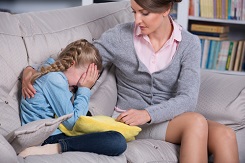 It may seem common for a child to ask hundreds of questions hour after hour. After all, children are notoriously curious by nature. However, when worry sets in and your child is so anxious that he or she questions every move, decision or plan for the day, it can be a sign that the child is coping with anxiety.
It may seem common for a child to ask hundreds of questions hour after hour. After all, children are notoriously curious by nature. However, when worry sets in and your child is so anxious that he or she questions every move, decision or plan for the day, it can be a sign that the child is coping with anxiety.
“Although anxiety runs in families, there’s a lot that we can do as parents and nannies to make things better or worse,” says Christine Korol, Calgary-based psychologist and author of WiredtoWorry.com.
If the children in your care exhibit signs of stress and struggle with uncertainty that is affecting their daily functions and physical health, it’s time to incorporate some strategies to help them cope with anxiety.
Recognizing Anxiety Disorders
It is common for everyone, including children, to experience stress and anxiety from time to time. Indications of anxiety disorders, however, can be seen when anxiety takes over someone’s thoughts and consistently affect his behavior.
The experts at KidsHealth Nemours, a nonprofit organization devoted to children’s health, defines anxiety disorders as the following:
- Generalized anxiety: With this common anxiety disorder, children worry excessively about many things, such as school, the health or safety of family members, or the future in general. They may always think of the worst that could happen. Along with the worry and dread, kids may have physical symptoms, such as headaches, stomachaches, muscle tension, or tiredness. Their worries might cause them to miss school or avoid social activities. With generalized anxiety, worries can feel like a burden, making life feel overwhelming or out of control.
- Obsessive compulsive disorder (OCD): For a person with OCD, anxiety takes the form of obsessions (excessively preoccupying thoughts) and compulsions (repetitive actions to try to relieve anxiety).
- Phobias: These are intense fears of specific things or situations that are not inherently dangerous, such as heights, dogs, or flying in an airplane. Phobias usually cause people to avoid the things they fear.
- Social phobia (social anxiety): This anxiety is triggered by social situations or speaking in front of others. A less common form called selective mutism causes some kids and teens to be too fearful to talk at all in certain situations.
- Panic attacks: These episodes of anxiety can occur for no apparent reason. During a panic attack, a child typically has sudden and intense physical symptoms that can include a pounding heart, shortness of breath, dizziness, numbness, or tingling feelings. Agoraphobia is an intense fear of panic attacks that causes a person to avoid going anywhere a panic attack could possibly occur.
- Posttraumatic stress disorder (PTSD): This type of anxiety disorder results from a traumatic past experience. Symptoms include flashbacks, nightmares, fear, and avoidance of the traumatic event that caused the anxiety.
As a nanny, take special note of any symptoms and signs your child is exhibiting and report these to the parents to determine the best plan of action to help the child cope.
A Gentle Approach
A common misconception about helping kids cope with anxiety is that we must help them avoid their fears and the unknown. According to Korol, this practice can make the situation worse. “If we are overprotective or allow our kids to avoid what they are afraid of, anxiety will grow,” she says. “If we are gently encouraging and comment on what a great job they’re doing coping with their anxiety, it starts to get better.”
Gentle reassurance, encouragement and acknowledgement of the anxiety shows the child that as the nanny, you are there when he or she needs to talk and work through anxious feelings. Knowing that you are there for support can give a child the courage he or she needs to tackle those fears.
Seek Professional Help
Even though you may offer support and encouragement, a child who is struggling with extreme anxiety may need professional help. Discuss the options with the child’s parents and seek out a family therapist or psychologist who can work with the child to calm his fears and develop coping strategies, says Korol.
“If anxiety is interfering with a child’s functioning, get help,” she says. “Anxious kids can appear very oppositional and they need to have a plan with strategies and proper pacing of facing their fears to ensure their success.”